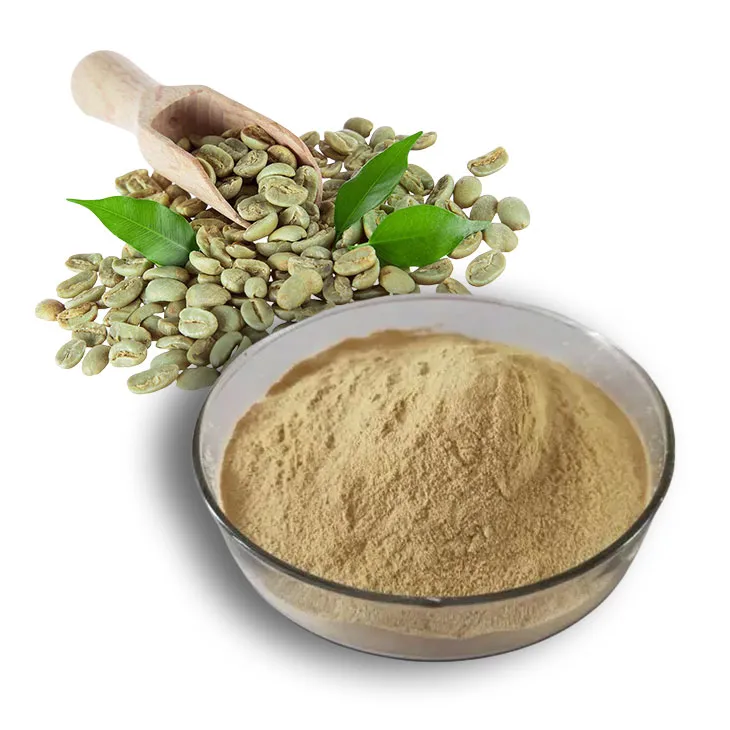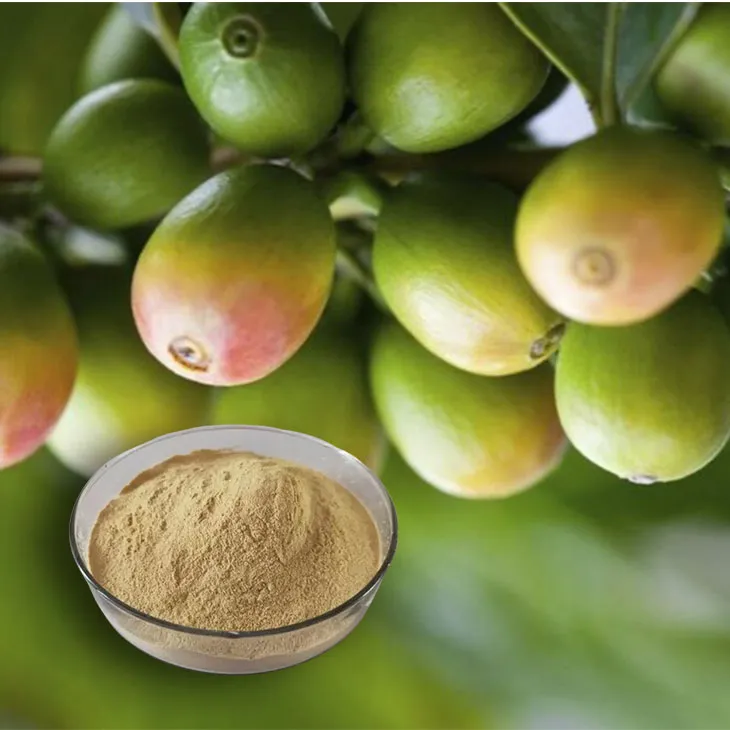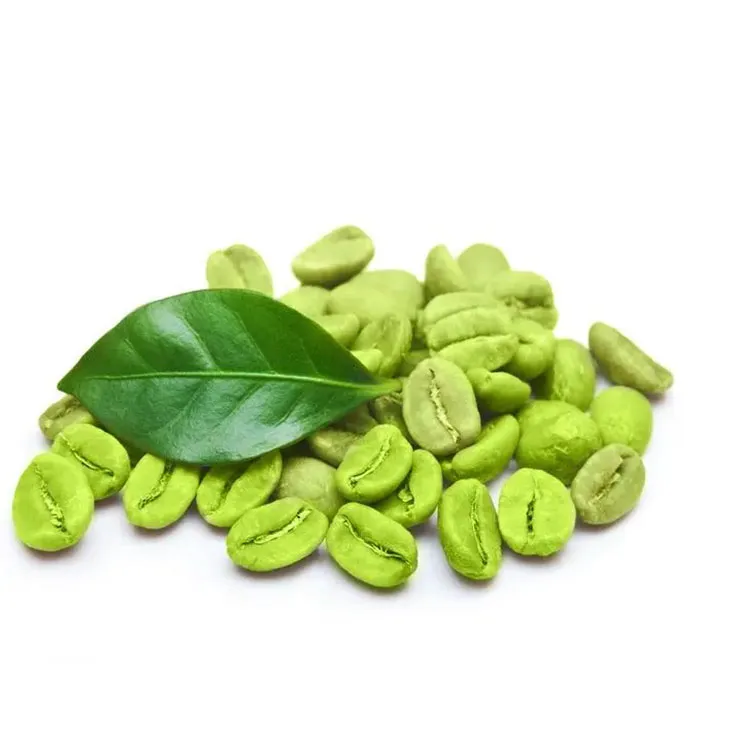- 0086-571-85302990
- sales@greenskybio.com
Green coffee bean extract - fertilizer and feed components.
2024-11-30

1. Introduction
The Green coffee bean Extract is garnering significant attention in the fields of fertilizers and feed. This extract, which is obtained from green coffee beans, holds great potential for various applications. In recent years, there has been a growing interest in exploring natural and sustainable ingredients for use in agriculture and animal husbandry, and the Green coffee bean Extract has emerged as a promising candidate.

2. Green coffee bean Extract as a Fertilizer Component
2.1 Positive Influence on Plant Growth
The green coffee bean extract has the potential to influence plant growth positively. It contains a variety of bioactive compounds that can play crucial roles in different aspects of plant development. For instance, certain components in the extract may act as growth regulators, stimulating cell division and elongation. This can lead to more vigorous growth of shoots and leaves, ultimately contributing to overall plant growth.
2.2 Root Development
One of the notable effects of the green coffee bean extract on plants is its impact on root development. A well - developed root system is essential for plants as it is responsible for water and nutrient uptake. The extract may contain substances that promote root branching and elongation. This allows plants to access a larger volume of soil, thereby increasing their ability to absorb water and essential nutrients such as nitrogen, phosphorus, and potassium.
Studies have shown that plants treated with green coffee bean extract often exhibit more extensive root systems compared to untreated plants. This enhanced root development can also contribute to better anchorage of the plant in the soil, reducing the risk of lodging, especially in taller plants.
2.3 Disease Resistance
Another important aspect of using green coffee bean extract in fertilizers is its role in increasing plant resistance to diseases. Plants are constantly exposed to various pathogens, including fungi, bacteria, and viruses. The bioactive compounds in the extract can enhance the plant's natural defense mechanisms.
Some components may act as elicitors, triggering the plant's immune response. This means that the plant is better prepared to recognize and defend against invading pathogens. For example, the extract may stimulate the production of phytoalexins, which are antimicrobial compounds produced by plants in response to pathogen attack.
2.4 Crop Yield Improvement
The combination of better root development, enhanced growth, and increased disease resistance ultimately leads to improved crop yields. When plants are healthier and more efficient in nutrient uptake, they are more likely to produce a greater quantity and quality of fruits, grains, or vegetables.
In addition, the green coffee bean extract may also have a positive impact on the flowering and fruiting processes of plants. It can influence hormonal balance within the plant, promoting the formation of flowers and ensuring proper fruit set and development.

3. Green Coffee Bean Extract in Animal Feed
3.1 Impact on Animal Metabolism
As a component of animal feed, the green coffee bean extract contains substances that can have a positive impact on animal metabolism. Metabolism is a complex set of biochemical processes that occur within an animal's body to maintain life. The extract can influence various aspects of metabolism, such as energy production and nutrient utilization.
For example, it may enhance the efficiency of carbohydrate and lipid metabolism. This can be beneficial for animals, especially those in the livestock industry, as it can lead to better growth performance and improved feed conversion ratios. Animals may be able to convert feed into body mass more efficiently, resulting in faster growth and reduced feed costs.
3.2 Gut Microbiota Health
The green coffee bean extract could also play an important role in maintaining a healthy gut microbiota in animals. The gut microbiota is a complex community of microorganisms that live in the digestive tracts of animals. These microorganisms play a crucial role in digestion, nutrient absorption, and immune function.
- The extract may contain prebiotic - like substances that can selectively stimulate the growth of beneficial bacteria in the gut. For example, it may promote the growth of lactobacilli and bifidobacteria, which are known for their positive effects on gut health.
- By maintaining a healthy balance of gut microbiota, animals are less likely to suffer from digestive disorders such as diarrhea and enteritis. Moreover, a healthy gut microbiota can also enhance the animal's immune system, as the gut is an important part of the body's immune defense.

4. Sustainability of Green Coffee Bean Extract
The sustainability aspect of the green coffee bean extract makes it an even more attractive option for fertilizers and feeds. In some cases, the extract can be sourced from coffee waste. Coffee production generates a significant amount of waste, including coffee husks and green coffee bean residues.
- By using these waste products to produce the extract, not only is waste reduced, but value is also added to the coffee industry. This promotes a more circular economy within the coffee sector.
- Furthermore, the use of green coffee bean extract as a natural and sustainable ingredient in fertilizers and feeds aligns with the growing consumer demand for environmentally friendly and sustainable agricultural and animal husbandry practices.
5. Challenges and Future Directions
5.1 Standardization of Production
One of the main challenges in the widespread use of green coffee bean extract in fertilizers and feeds is the standardization of production. Currently, there is a lack of uniform production methods and quality control standards. Different extraction techniques may result in extracts with varying compositions and potencies.
- To ensure consistent results in plant growth promotion and animal health benefits, it is essential to develop standardized production protocols. This includes defining optimal extraction conditions, such as solvent type, extraction time, and temperature.
- Quality control measures also need to be established to monitor the purity and potency of the extract. This may involve the use of analytical techniques to identify and quantify the bioactive compounds present in the extract.
5.2 Research on Long - Term Effects
While initial studies have shown promising results regarding the use of green coffee bean extract in fertilizers and feeds, more research is needed on the long - term effects. For example, in the case of plant growth, it is important to determine whether continuous use of the extract over multiple growing seasons has any negative impacts on soil health or plant productivity.
- In animal feed, long - term studies are required to assess the safety and potential cumulative effects of the extract on animal health. This includes investigations into whether there are any adverse effects on organ function or reproductive performance over extended periods of exposure.
- Long - term research is also necessary to understand the potential environmental impacts of using green coffee bean extract - based fertilizers and feeds. For instance, how does the extract interact with soil microorganisms over time, and what are the implications for soil biodiversity?
5.3 Market Adoption and Cost - Effectiveness
Another challenge is the market adoption and cost - effectiveness of green coffee bean extract - based products. For these products to gain widespread acceptance in the fertilizer and feed markets, they need to be competitive in terms of price and performance.
- The production cost of the extract needs to be optimized to make it an affordable option for farmers and livestock producers. This may involve exploring more efficient extraction methods and economies of scale in production.
- Marketing and promotion efforts are also crucial to increase awareness among end - users about the benefits of green coffee bean extract - based fertilizers and feeds. This includes providing scientific evidence of their effectiveness and demonstrating their value - for - money compared to conventional products.
6. Conclusion
The green coffee bean extract has shown great potential as an ingredient for fertilizers and feeds. Its positive effects on plant growth, disease resistance, and crop yields, as well as its benefits for animal metabolism and gut microbiota health, make it a valuable addition to the agricultural and animal husbandry sectors. However, to fully realize its potential, challenges such as production standardization, research on long - term effects, and market adoption need to be addressed. With further research and development, the green coffee bean extract could play an increasingly important role in sustainable agriculture and animal husbandry in the future.
FAQ:
1. What are the benefits of green coffee bean extract as a fertilizer component?
As a fertilizer component, green coffee bean extract has the potential to positively influence plant growth. It can contribute to better root development, increase plants' resistance to diseases, and improve crop yields.
2. How does green coffee bean extract affect animal metabolism as a feed component?
Green coffee bean extract contains substances that can have a positive impact on animal metabolism. For example, it could help in maintaining a healthy gut microbiota in animals.
3. Why is green coffee bean extract considered a sustainable option?
It can be sourced from coffee waste in some cases. This reduces waste and adds value to the coffee industry while also benefiting agriculture and animal husbandry, making it a sustainable option.
4. Can green coffee bean extract completely replace traditional fertilizers?
At present, it is unlikely that green coffee bean extract can completely replace traditional fertilizers. While it has potential benefits, more research is needed to determine its full capabilities and limitations. Traditional fertilizers have been developed and optimized over a long period, and they still play important roles in large - scale agricultural production. However, green coffee bean extract can be used as a supplement to traditional fertilizers to potentially enhance plant growth and health.
5. Are there any potential drawbacks of using green coffee bean extract in feed?
Although green coffee bean extract has positive effects on animal metabolism, potential drawbacks may exist. For example, excessive use may lead to imbalances in the animals' diet or unforeseen interactions with other feed components. More research is required to fully understand and address these potential issues.
Related literature
- The Potential of Green Coffee Bean Extract in Sustainable Agriculture"
- "Green Coffee Bean Extract: A Novel Ingredient for Animal Feed"
- "Beneficial Effects of Green Coffee Bean Extract on Plant Growth and Health"
- ▶ Hesperidin
- ▶ citrus bioflavonoids
- ▶ plant extract
- ▶ lycopene
- ▶ Diosmin
- ▶ Grape seed extract
- ▶ Sea buckthorn Juice Powder
- ▶ Beetroot powder
- ▶ Hops Extract
- ▶ Artichoke Extract
- ▶ Reishi mushroom extract
- ▶ Astaxanthin
- ▶ Green Tea Extract
- ▶ Curcumin Extract
- ▶ Horse Chestnut Extract
- ▶ Other Problems
- ▶ Boswellia Serrata Extract
- ▶ Resveratrol Extract
- ▶ Marigold Extract
- ▶ Grape Leaf Extract
- ▶ blog3
- ▶ blog4
-
The Most Highly - Praised Seabuckthorn Oil.
2024-11-30
-
Wholesale Acai Berry Extract Suppliers.
2024-11-30
-
The best artichoke leaf extract from nature.
2024-11-30
-
Optimal Bioavailability of Green Tea Extract
2024-11-30
-
The best lemon extract on the market.
2024-11-30
-
Active ingredients in kelp extract powder.
2024-11-30
-
How to make powder from hawthorn extract?
2024-11-30
-
Uridine-5'-monophosphate Disodium salt
2024-11-30
-
Saffron Extract Powder
2024-11-30
-
Red Vine Extract
2024-11-30
-
Oyster Mushroom Extract Powder
2024-11-30
-
Rose Hip Extract
2024-11-30
-
White Peony Extract
2024-11-30
-
Mulberry leaf Extract
2024-11-30
-
Acerola Juice Powder
2024-11-30
-
Beta Carotene
2024-11-30
-
Horse Chestnut Extract
2024-11-30





















